 |
A Branch of the Jarvis Family
Janet Robinson
7. Daniel Jarvis (3rd)
Daniel Jarvis 3rd was baptised on the 30th January 1767, at the Parish church at Deal, son of John (4th) and Ann. The family were living in Deal while John was a Lieutenant in the Royal Navy, but they were later to move to Margate.
Daniel entered Guys Hospital, London, to train as a doctor. While a student he made copious notes, which were later bound into volumes and after Daniels death were presented to the library of Guys Hospital by his grand nephew, H. Waddington.
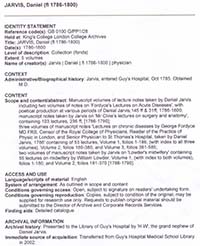 |
Records of Daniel Jarvis at Guy's Hospital |
Less than three years later, on the 1st January 1788, Daniel placed an advertisement in the Kentish Gazette stating: -
Jarvis
Apothecary, Practitioner in Midwifery, and Member of the Corporation of Surgeons in London.
Avails himself of this method respectfully to inform his friends and the public in general, that his attention and care in every part of the above profession shall be unlimited, meriting, he presumes, their confidence and support, which will gratify his highest ambition.
N.B. Will attend any poor woman gratis, within six miles, for four months from the date hereof.
Church Fields, Margate, January 1st 1788.
The address, Church Fields, could be one of the properties built by his father in Hawley Square, as he is listed as being at 18 Hawley Square in 1802. By 1811 he has a separate surgery in Cecil Square. By 1823 he is in partnership with his nephew Joshua Waddington, with their address given as 14 Cecil Square. In the directory of 1826, as well as the surgery he is listed at Upper Marine Terrace, and he lived there until his death in 1833.
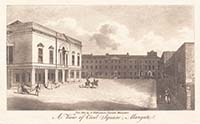 |
Cecil Square with Assembly Rooms and Royal Hotel |
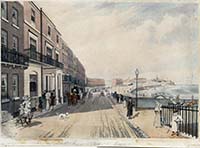 |
Marine Terrace 1828 |
In 1798 England was at war with France, and on the 14th May a squadron of ships assembled at Margate, where a troop, commanded by Major General Eyre Coote, boarded. Joining them was Daniel Jarvis who had volunteered his services as a surgeon. The British had mixed fortunes in this skirmish at Ostende, which ended with several of the troops being taken prisoner, including Daniel. The full details are given in this article taken from the Naval History of Great Britain – vol 2.
Intelligence having reached the British government, that a great number of transport-schuyts were fitting at Flushing, or Flessingue, preparatory to their being convoyed by the Bruges canal to Dunkerque and Ostende, in order to be employed in the long-threatened invasion of England, a squadron, consisting of one 44-gun ship flute (mounting 26 guns), two 28-gun frigates, two 20-gun ships, three frigate flutes (mounting about 14 guns each), and 17 sloops, bombs, and gun-vessels, under the orders of Captain Home Riggs Popham, in the Expedition flute-44, assembled at Margate, and there received on board a body of troops, commanded by Major-general Eyre Coote.
On the 14th of May the squadron set sail for the opposite coast, but, owing to an unfavourable change in the weather, did not, until the 19th, at 1 a.m., reach their intended anchorage in front of the town of Ostende. Soon afterwards the wind, shifting to west and blowing hard, raised a heavy surf on the shore. Still, as information had just been received, by a captured vessel, that the force in Ostende, Nieuport, and Bruges, was very small, it was resolved to land the troops immediately, and trust to the weather's moderating for their safe re-embarkation. One of the transports, the frigate-flute Minerva, Captain John Mackellar; having on board the four light-infantry companies or the first regiment of guards, under Lieutenant-colonel Ward had recently parted company. The remainder of the troops, with Major-general Coote at their head, consisting of two light infantry companies of the Coldstream guards, two similar companies belonging to the third guards, the 11th regiment of foot, and the flank companies of the 23d and 49th regiments, numbering, including a small party of miners, about 1140 officers and men, with six pieces of ordnance, also wooden petards, tools, and the necessary quantity of gunpowder for effecting the intended explosion, disembarked, and at about 3 a.m., without opposition or even discovery, effected their landing at a short distance to the eastward of the town.
At about 4 h. 15 m. a.m. the batteries at Ostende opened their fire upon the three nearest British vessels, which were the brig-sloop Wolverine, Captain Lewis Mortlock, and gun-brigs Asp and Biter, Lieutenants Joseph Edmonds and John Dennis De Vitré ; and, for upwards of four hours, a mutual cannonade was maintained. At the end of that time, however, the Wolverine and Asp had sustained considerable damage in their hulls and rigging; with, to the latter the loss of one seaman killed, and her commander wounded, and, to the former, of one seaman and one private of the 23d regiment killed, and 10 seamen and five privates of the same regiment wounded. The bombs Hecla and Tartarus, Captains Thomas Hand and James Oughton, had, in the mean time, been throwing their shells into the town and basin, with great quickness and some effect; much damage having, as alleged, been done to the shipping in the latter, and the former having been seen several times on fire.
Owing to the damaged state of the Wolverine and Asp, the commodore signalled them to weigh and move further off; and the ship-sloop Dart (carrying twenty-eight 32-pounder carronades), Captain Richard Raggett, and the 18-gun brig-sloops Kite and Harpy, Captains William Brown and Henry Bazely, forthwith proceeded to occupy the stations which the Wolverine and Asp had quitted; but, owing to its being low-water, the Dart and her companions were compelled to anchor at a greater distance from the shore than their commanders wished or their short-gun batteries suited. Consequently, the subsequent cannonade between the shore and the shipping was neither animated nor effective.
At 9 h. 30 m. a.m. the Minerva came in and anchored; and Captain Mackellar, by the orders of the commodore, immediately went on shore in his boat to report the ship's arrival to the general. In the mean time Lieutenant-colonel Ward, with a becoming zeal, had filled two flat-bottomed boats with the troops, and was on his way to disembark them, when, as the boats pulled near to the 20-gun ship Ariadne, her commander, Captain James Bradley, succeeded in persuading the colonel to return immediately on board the Minerva; and thus the four fine companies, commanded by Colonel Ward, to his and their present regret, but subsequent joy, were not allowed to land.
The troops that had landed appear to have fully succeeded in blowing up the locks and sluice-gates of the Bruges canal, and in destroying several gun-boats lying in the basin, with the trifling loss of one private soldier killed, and one seaman wounded. The explosion, as seen from the shipping, took place at 10 h. 20 m. a.m., and by noon the troops were ready to re-embark; but such was the state of the weather, that the measure was wholly impracticable. The British then took up a position on some sand-hills near the beach, and there remained under arms but unmolested, during the remainder of that day and the whole of the ensuing night. By daybreak on the 20th, however, the French had collected in considerable force; and, after a smart action in which the British sustained a loss of about 65 in killed and wounded, including, among the form, one lieutenant-colonel, and among the latter, the major-general and several distinguished officers, the whole, with Captain Mackellar and the survivors of his boat's crew, were compelled to surrender on terms of capitulation. Thus ended an expedition,
The Kentish Chronical of May 25th 1798 states: -
(troops to Ostend) -. …such of the troops as were taken prisoner have been treated with every attention, and passed into Ostend without any molestation from the inhabitants (which might have been expected by the destruction of part of the town by bombardment) – In addition to the troops, many of the seamen who were employed to convey the powder etc. have also been taken. We are concerned to say Captain Walker of the artillery …is supposed to be mortally wounded. Amongst the prisoners is Mr. Jarvis, Surgeon, of Margate, who volunteered his services.
In a further article on September 4th we learn of Daniels return: -
Dover – September 2nd – The neutral packet-boat, Maria, arrived here this morning …on board of which was Major General Coote, accompanied by Mr. Jarvis, surgeon, of Margate, and Major General England. They have parole permission from the Directory to remain three months in England, then to return and deliver themselves up as prisoners of war in France. They left the citadel of Lisle on Friday last, at which time the officers and men of the Artillery, of the detachment of Guards of the 23rd and 49th regiments of foot, as well as the officers and men of his Majesty’s navy, were in good health.
By September 7th he is back in Margate: -
Mr. Jarvis, a native of this town, who voluntarily and generously attended the late expedition to Ostend, in quality of a surgeon, where he particularly distinguished himself, arrived here on Sunday last, after having been in a French prison more than three months.
He was received with joy and congratulations by his numerous acquaintances; and yesterday evening the Margate volunteers assembled on the Eastern Cliff and fired several rounds of musketry, and a few shots from their field pieces, as a manifestation of their joy on the safe return of their townsman, who is also one of their officers. When the firing was over, Mr. Jarvis addressed the corps in terms of warm acknowledgements for the honour they had done him.
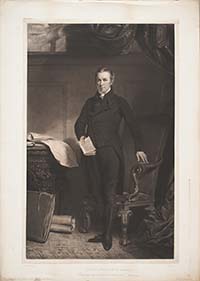 |
Daniel Jarvis |
Little is known about Daniels personal life and character, just a few snippets of information. John Williams of Margate museum sent me the following: -
Details of his private life are scanty, but he was evidently a man of great determination and vision, and apart from the Cobb family, hereditary Deputies of the town, no one wielded greater influence in local affairs. It was inevitable that so forceful a character should be involved in many disputes that divided Margate in those days. Once his face was slapped in the street by a lady of title, and in 1810 he was engaged in a terrific battle of words caused by nothing more serious than the loan of a book.
Stewart Warrender Viney was born in 1820 and spent most of his youth in Margate in the 1820s and 30s. Years later, while living in Australia he wrote many letters back to the Keebles Gazette entitled ‘ recollections of Margate’. These reminiscences have been published in a book by Stephen Channing, and one of the memories is about the local Margate doctors, including Daniel Jarvis: -
Of the medicos of the period – Dr. Jarvis, a mighty, pompous, white headed, gold-capped cane gentleman, too too utter for ordinary mortals to come near; Dr. Waddington (his nephew I believe), a keen, shrew’d practitioner, who understood the Londoner “off the chain” exactly, and administered the corrective colocynth and calomel freely and generally with success; then there was the dear old Dr. Price, whose bland happy manner rendered physic – however nauseous – pleasant to take if ordered by him. Then there were other doctors Hoffman, Hunter, and others, but I only knew them by name and remember no peculiarity.
William Kidd who wrote a guide to Margate in 1831 seems to have been a great fan of Daniels, as he wrote: -
Margate originally consisted of one long irregular street, but it’s buildings now cover the slopes of two extensive hills, and the valley between them. A company of public spirited individuals first rendered the town attractive, by the erection of fit dwellings for the noble and the rich; and the unrivalled superiority of Margate as a bathing retreat, coupled with the facilities of communication, afforded by the modern improvements in steam, have given rise to its present importance.
At the same time, the writer of these pages feels himself bound in justice to record, that the prosperity of the town is mainly attributable to its numerous public buildings, which have been mostly projected by, and carried to a successful completion, through the indefatigable exertions and energetic conduct of Dr. Jarvis.
The Theatre Royal at Margate was very popular in the early 1800s, with the top stars of the day from Drury Lane and Covent Gardens appearing for special performances. Towards the end of each summer season local amateur actors would often appear with the professionals. The Times of 25th September 1804 stated: - Mr. Jarvis eminent surgeon of this place, and Garner, the librarian, have been acting parts.
In 1815 Daniel was part owner of the vessel Royal Sovereign of Margate. He became partowner of The Earl of Clancarty in 1818, and The Earl of Bathurst in 1819.
In 1825 he gave £50 in trust, for the churchwardens to pay the interest to the Margate ringers, on the 30th January, in every year, forever, provided they should ring one peal of grandsire triples, or not less than 6 hours change ringing, on the bells of the parish steeple on the 29th of January, the anniversary of the accession of Kung George the Fourth.
Daniel Jarvis name is usually remembered for his connection with the Margate Pier and Harbour Company.
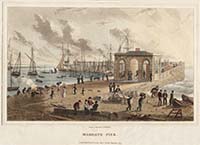 |
Pier and Droit House 1819 |
A guide published in 1825 states that after the great storm of 1808,which destroyed bathmg rooms and Garner's Library and left a twenty-foot chasm in the High Street. Parliament granted the town £5,000 towards the cost of repairing the damage. The story goes on;-'After several partial plans being produced, and expedients offered for repairing and extending the old pier, Mr. Jarvis, surgeon, of the place, not less esteemed for his acknowledged professional abilities than his active exertions on all occasions for the public welfare, suggested the idea of improving the present calamity into a future permanent benefit, and protesting against suffering the sum granted, together with such other sums as might be borrowed under the sanction of Parliment, to be lost or wasted on temporary expedients, proposed to erect an entire new pier, "this idea may undoubtedly be called a bold one when we consider the deep-rooted prejudices of mariners, who, perhaps more tenacious of their opinions than any other class of men, are more disposed to make cavils or raise objections against some particular parts than to obviate or remove them. But Mr Jarvis, being a man who unites to public spirit a most determined perseverance, after encountering much opposition and obloquy, fortunately surmounted every obstacle. The great work of building the present stone pier, as suggested by Mr. Jarvis was begun in 1810,and as the fund available were insufficient to meet the cost the Commissioners applied to Parliament for permission to vest the property of the pier and harbour in a joint stock company, who would undertake to finish the work. That was the origin of Margate Pier and Harbour Company, and in 1812 Mr. Jarvis was elected its first chairman. The company were not entirely philanthropic, for they secured their investment by levying a duty of two shillings on every passenger to and from London in addition to collecting dues on goods laden and unladen on vessels coming to Margate. They also made a charge to visitors using the pier as a promenade, so there is every reason to believe that the private purses of the directors were in no way hurt
(Information from John Williams, Margate museum)
In 1815 the directors were so pleased with the new pier they decided to present Daniel with an elegant service of plate, and in the following August the presentation took place at a public dinner held at the Royal Hotel in Cecil Square. Upwards to eighty gentlemen were present, and as thirty-three toasts were drunk during the evening it sounds as though a good time was had by all.
From October 1836 to June 1838 a series of letters appeared in the Canterbury Journal, relating to the Margate Pier and Harbour Company and its errors in their accounts. Daniel Jarvis and Francis Cobb came in for particular abuse. In ‘The Margate Tales’ by Stephen Channing is this quote from one of the letters: -
…I must go back to the period when the late Dr. Jarvis, as chairman, aided by his toadies and sycophants, ruled the ‘Pier and harbour Company’, - and frequently the town – with a rod of iron; he was, indeed, obeyed, although ‘more from fear, than from love.’
The Treasurer of the Company, and Deputy of the town, at that time (the late Mr. F Cobb, commonly called ‘King Cobb’), was a quiet inoffensive man; in truth, little fitted for the endless worry and strife of public business, which induced him to leave much for Dr Jarvis to arrange. The latter (a vain, ambitious character), it is said, heartily disliked the ‘Royal Family,’ but, occasionally consulted his own views and interests, by giving the Treasurer and Deputy, a large ‘sop in the pan’. Thus, the time of paying the dividends by the Pier and Harbour Company was notoriously altered from the 6th April, solely for the purpose of pleasing ‘His Majesty,’ by increasing his already enormous profits.
The original sailing hoys at Margate used to disembark their passengers from the stone pier in the harbour, but the new larger steam packets, which started to arrive in 1815, could only land at high water. At low tide they had to anchor offshore and passengers and their luggage would be rowed ashore by the local boatmen.
At the instigation of Daniel Jarvis plans were drawn up for the construction of a landing place, or jetty, next to the stone pier.
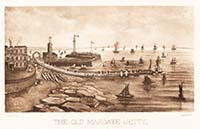 |
The Old Margate Jetty 1853 |
Kidd’s Guide to Margate of 1831 states; -
..this useful work was completed in 1824, at the cost of eight thousand pounds, which was, with extraordinary liberality, entirely borne by the company of pier proprietors, from whom it must therefore be regarded as a munificent gift to the public. It is constructed of English oak, measures eleven hundred and twenty feet in length, and at low tide, is deservedly considered one of the most inviting marine walks which fancy can imagine, or experience realize.
The new jetty was given the name Jarvis’ Landing Place, after Daniel Jarvis in recognition of his services to the Pier Company. There was a serious flaw to the jetty as the end was higher than the middle of the jetty, which meant that at high water the middle section was often submerged, leaving passengers stranded at the far end. This caused great amusement to onlookers on the shore, and was of benefit to the fleet of local boatmen who would cluster around touting for trade.
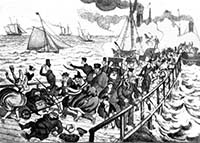 |
The Jetty |
Not everyone was in favour of Jarvis Jetty. Shortly after the opening an effigy of Dr Jarvis was burned at the entrance to the pier, as he was blamed by the local boatmen for the loss of their trade in conveying passengers and luggage from the London boats, which used to anchor offshore.
A handsome, richly ornamental cast-iron archway was placed at the entrance to the landing place as a tribute to Daniel.
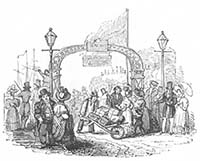 |
Entrance to Jetty |
Jarvis’ Jetty served the town well and hundreds of thousands of passengers used it for landing from the steamboats and hoys. By the early 1850s however it needed replacing, having suffered from damage from vessels, storms and the marine worm. It was decided to demolish the old landing place and replace it with one made of iron. The demolition of the old jetty started in 1852, with the new structure opening in 1857, with an extension opened in 1877.
When the new Jarvis landing place was erected an inscription engraved on a granite column was placed at the foot of the stone steps, which led to the promenade.
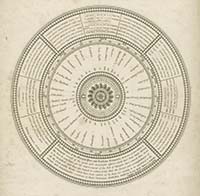 |
Presentation to Daniel Jarvis 1828 |
The inscription on one of the sections reads: - The Directors of the Margate Pier and Harbour Company, desirous of providing a permanent record of the great and successful efforts which have been made during the last twenty years for the improvement of the Port of Margate, have caused this stone to be inscribed: and they are bound to acknowledge that the design and accomplishment of all the great public works which have been carried on by them, are mainly to be attributed to the talents and indefatigable exertions of their Chairman, DANIEL JARVIS ESQ. M.D. MDCCCXXVIII. STEPHEN SACKETT CHANCELLOR, CLERK.
 |
One of the inscriptions |
The other sections round the circle listed various building projects, which had happened in the town. The centre was a compass with a list of towns of interest in England and France.
Apart from his involvement with the Pier and Harbour Company Daniel belonged to many other committees, including the Gas Light Company and the Margate Prosecution Association, as these posters show.
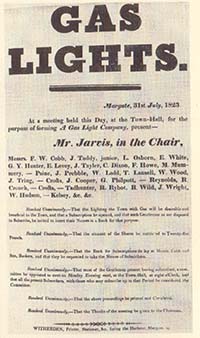 |
Gas Lights 1823 |
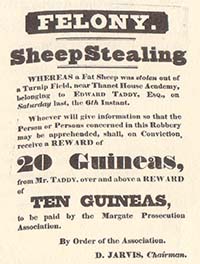 |
Margate Prosecution Association |
Dr. Daniel Jarvis died at Margate on the 18th March 1833, aged 67 years.
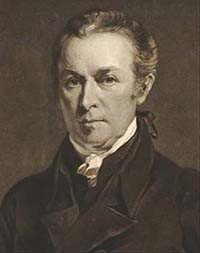 |
Portrait of Daniel Jarvis |
I have found no marriage for him, and no mention is made in his will of a wife or children. His main beneficiaries are his sister and nephews and nieces.
So, with no male heirs this was the end of this particular line of the Jarvis family.
Daniel was buried in a vault in St. John’s Church, Margate, and this plaque can be seen in the church.
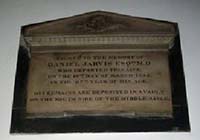 |
Jarvis memorial |
The Will of Dr. Daniel Jarvis
Born Deal 1767 – died Margate 1833
This is the last will and testament of me Daniel Jarvis of Margate, in the Parish of Saint John the Baptist, in the Isle of Thanet, in the County of Kent, doctor of medicine. First I direct that all my just debts and funeral and testamentary expenses may be duly paid and satisfied as soon as conveniently may be after my decease.
I give and devise unto my respected nephew Joshua Waddington, of Margate aforesaid, surgeon, my friend Stephen Sackett Chancellor, of Margate aforesaid, Baker, and my nephew Edward Waddington, of Seven Oaks, surveyor, and to their heirs and assigns for ever all and singular my freehold messuages, lands, tenements and …….. whatsoever, with their and every of their rights, appurtenances, to hold the same unto and to the use of the said Joshua Waddington, Stephen Sackett Chancellor and Edward Waddington, their heirs and assigns for ever nevertheless upon the trusts and for the ….. and intent and purpose hereinafter expressed and declared concerning the same.
That is to say upon trust that they the said Joshua Waddington, Stephen Sackett Chancellor and Edward Waddington, or the survivors or survivor of them, or their heirs or assigns of such survivor, do and shall at any time or times when they, or be in their, or his, direction shall think proper, make sale and absolutely dispose of the said messuages and other heredits hereinbefore devised, with the appurtenances and the fee simple and inheritance thereof. And in such lots or parcels, and either by public auction or by private contract, or partly by public auction and partly by private contract, as my said trustees or trustee, for the time being shall think fit or advisable, and ………. or otherwise afore the same, when sold unto the person or persons who shall agree to become the purchaser or purchasers thereof. His, her, or their heirs or assigns, or such other person or persons or to upon or for such uses, trusts, intent and purposes as hereafter then shall direct or appoint.
And I direct that the money which shall arise or be produced by or from such sale or sales as aforesaid, shall in the first place be applied in making good the deficiency if any of my personal estate, in paying my debts, funeral and testamentary charges, the legacies and annuities hereinafter bequeathed ……. And except the several legacies for charitable purposes hereinafter bequeathed I expressly direct shall be payable out of such part of my personal estate as by law can be charged and made liable to the payment thereof prior to the payment of my simple contract, debt ………, debts or the payment of my funeral and testamentary expenses or to the several other legacies and annuities bequeathed by this my will.
And that the said ….. of such monies or the whole thereof if there shall be no such before …. shall be decided and paid to such person or persons in such proportions and be applied for such intents and purposes as the residue of my personal estate is hereinafter directed to be divided, paid, and applied.
And I also direct that the said moieties shall ……… until sale thereof be considered as personal estate for all purposes (except as before excepted) of this my will. And that the rents and profits of the same moieties shall be paid and applied to and for the benefit of the person or persons who for the time being shall be entitled to the account of any personal estate or of the proceeds thereof.
And I direct and declare it to be my will that the person or persons respectively who shall become the purchaser or purchasers of my said messuages and other heredits hereinbefore devised, or any part thereof, his, her, or their heirs, executors or advisors, shall not be obliged or required to see to the applications of the monies paid or advanced by him, her or them respectively as the consideration of such purchase or purchases, or be answerable or accountable for the misapplication or ….application of the same moiety, or any part thereof after the same shall have been paid, as for to the order of my said trustees or the survivor or survivors of them, their heirs, executors or administrators.
Nor be obliged or required to ascertain or inquire into the ……… or propriety of any such sale or sales as aforesaid. And that every receipt ……. shall be given by my said trustees, or the survivors or survivor of them, for such purchase money, or any part thereof shall be a good valid and sufficient aquittance and discharge for the sum or sums of money which therein or thereby respectively shall be acknowledged or expressed to have both received. And that every sale which shall be made and contract for sale …. shall be entered into, and conveyance or other ………. which shall be exonerated by my said trustees or the survivors, or survivor of them, his heirs, executors or administrators shall be binding and cond…. on all persons entitled to any benefit under this my will.
I give and bequeath to the treasurer for the time being of the National School at Margate the sum of one hundred pounds. To be by him applied and disposed of, to and for the general purposes, benefit and advantage of that school.
To the treasurer for the time being of the Philosophical Institute at Canterbury the sum of one hundred pounds, to be by him applied and disposed of to and for the general purposes, benefit and advantage of that institution.
To the treasurer for the time being of the Society found in London for the Promotion of Christian Knowledge the sum of two hundred pounds, to be by him applied and disposed of to and for the general purposes, benefit and advantage of that society.
To the Vicar and Church Wardens of the Parish of Saint John the Baptist, Margate, the sum of five hundred pounds. To be by them invested in the three pounds per residence Bank Annuities in the name of four trustees to be nominated and appointed by the trustees of this my will. The interest and annual income thereof I direct shall be received by such trustees yearly. And by them paid to the Minister and Church Wardens of Saint Johns, Margate, for the time being. And by the latter added to the fund collected for distribution to the poor communicants of Saint Johns Parish. And to be distributed by such Minister and Church Wardens as part of the sacrament money to those poor and aged persons who may in their discretion be thought, from a regular devout attendance at the Lords Table, proper and deserving objects to receive the same.
And I direct that on the death or refusal to act of any two of the said trustees then that the surviving two of such trustees shall forthwith appoint two other trustees to assist them upon the trusts aforesaid. All expenses attending such appointment and removals I direct to be paid out of the interest and proceeds of the sum of five hundred pounds. And I request my nephew the said Joshua Waddington and the said Stephen Sackett Chancellor will accept the office of two of such four trustees.
To the treasurer for the time being of The Theatrical Fund Society in London, the sum of one hundred pounds to be by him applied and disposed of to and for the general purposes, benefits and advantages of that institution.
To the trustees for the time being of the Philanthropic Institution of Margate the sum of five hundred pounds, to be by him applied and disposed of to and for the general purposes, benefit and advantage of that institution.
To the treasurer for the time being of the Lying - In Charity of Margate the sum of one hundred pounds to be by him or her applied and disposed of to and for the general purposes, benefits and advantages of that charity.
Which said several charitable bequests I expressly charge upon and direct to be paid out of such part of my personal property as by… all be charged and made liable to the payment thereof prior to my debts, funeral and testamentary expenses. And the several other legacies and annuities bequeathed by this my will and sale of land or equity to the contrary not withstanding.
I also give and bequeath the following legacies: -
Namely to my niece Mary Ann Ornsby, wife of the Revd. Ornsby, the sum of four hundred pounds.
To my niece Elizabeth Hirt, wife of Samuel Hirt, surgeon, the sum of two hundred pounds.
To my niece Maria Jarvis the sum of fifty pounds.
To my niece Annette Surman, daughter of William Henry Surman, Esquire of Golden Square London, the sum of twenty pounds.
To my nephew Henry Surman the like sum of twenty pounds.
To my cousin Mary Oakley now residing at Pittsburgh in North America the sum of two hundred pounds. In the event of my said cousin Mary Oakley not surviving me then I bequeath the said sum of two hundred pounds to my cousins, the brothers of the said Mary Oakley, to be divided equally between them as tenants in common. And if but one of such brothers shall be living at the time of my decease then to such one brother only.
To my cousin James Stranack of Margate, aforesaid, the sum of two hundred pounds.
To my cousin John Stranack of Margate, aforesaid, the like sum of two hundred pounds.
To my cousin Jeremiah Stranack of Margate, aforesaid, the like sum of two hundred pounds.
To my cousin David Holness of Margate, aforesaid, the sum of one hundred pounds.
To my respected friend Robert Salter of Margate, aforesaid, the sum of one hundred pounds.
To my respected friend James Mickleburgh the elder, of Thanet House Academy, the like sum of one hundred pounds.
To my respected friend William Edmunds of Margate, aforesaid, the like sum of one hundred pounds.
To my respected friend Frances Reynolds of Gordon House Seminary the like sum of one hundred pounds.
To my friend Mary Gore of Cecil Square, spinster, the like sum of one hundred pounds.
Catherine Howe, daughter of Francis Howe of The Royal Hotel, Margate, the sum of fifty pounds.
To my friend Stephen Sackett Chancellor the sum of one hundred pounds upon trust to meet the same or real or personal all security, and to pay the same to James Taylor formerly of Margate, but now a convict at New South Wales, as soon as his sentence shall expire, or he shall receive His Majesty’s most gracious pardon. The interest thereof in the meantime to be appropriated by the said Stephen Sackett Chancellor for the welfare of such portion of the family of the said James Taylor as he may see fit. Should the said James Taylor die a convict then I direct the said Stephen Sackett Chancellor to pay the said legacy of one hundred pounds to Maria, wife of the said James Taylor, to whom in that case I bequeath the same accordingly.
To Mr Clement Taylor Smith of Maidstone, the sum of twenty guineas to be by him laid out in the purchase of any article best calculated to show how much I have ever felt myself obliged by his great and unsolicited and ineffectual exertions in the case of James Taylor the convict.
To Eliza Tadhunter of Margate, aforesaid, widow, the sum of one hundred pounds.
To Robert Ansell the elder of Margate, aforesaid, carrier, the sum of fifty pounds.
To Richard Boulden of Margate, mariner, the sum of one hundred pounds.
To Thomas Cleveland of Margate, labourer, the sum of fifty pounds.
To Humphrey Emptage the elder of Margate, mariner, the sum of fifty pounds,
To George Major the elder of Margate, mariner, the sum of fifty pounds.
To George McBlain of Margate, mariner, the sum of fifty pounds.
To John Miller of Margate, mariner, the sum of fifty pounds.
To Stephen Ovenden of Margate, ropemaker, the sum of fifty pounds.
To Mary Fry, daughter of John Fry, formerly of The Sussex Tavern, Tunbridge Wells, the sum of one hundred pounds.
To James Adams, of Mutrix in this parish, the sum of fifty pounds.
To Susan Ladd of Margate, aforesaid, spinster, the sum of twenty five pounds.
To Rachel Ladd of Margate, aforesaid, spinster, the like sum of twenty five pounds.
To my nephew Joshua Waddington the sum of four hundred pounds as a specific remuneration for the trouble he may have in acting as one of the Trustees and executor of this my will.
To the said Stephen Sackett Chancellor the sum of three hundred pounds as a remuneration for the trouble he may have in acting as one of the Trustees and executors of this my will.
To my nephew Edward Waddington the sum of four hundred pounds as a specific remuneration for the trouble he may have in acting as one of the Trustees and executors of this my will.
To my late coachman William Jarret the sum of nineteen pounds nineteen shillings.
To my coachman David Quiror? the sum of ten pounds.
To my footman John Chapman the sum of ten pounds.
To my female servant Mary Ann Parker the sum of ten pounds.
I also give and bequeath unto my sincerely respected friend Mrs. Ann Turner Brown of Margate, aforesaid, the Dresden Plateau of fruit now standing in my drawing room.
To my nephew Joshua Waddington the gold watch chain and seals I now wear.
To my friend the Reverend William Frederick Bayley of the precincts of Canterbury the portrait of Lord Nelson, formerly belonging to my deceased friend Sir Thomas Staines.
To my friend Henry Cotton, Esquire of Kingsgate, my fowling piece.
To Arthur Cotton, Esquire, brother of the said Henry Cotton, my case of pistols, of which I beg his acceptance.
To my friend the Reverend James Salisbury, late of Saint Peters in this Island, a mourning ring of the value of ten guineas.
To my most kind and invariably attached? friends the Misses Osborn, daughters of Latham Osborn, Esquire, my cabinet formerly belonging to his Royal Highness the late Duke of York. Also my small ebony cabinet. Also the Ibis, and also the gold pencil case which I generally use and which they will please to apportion between them.
To my kind and good friend Mrs. Margaret Forster, wife of Francis Forster esquire, the box of moths and butterflies brought from Rio?
To Admiral Thomas Harvey the twelve busts of Naval Officers brought home by Sir Thomas Staines.
I also give and bequeath unto my beloved sister Sarah Waddington, widow, one annuity or the yearly sum of one hundred and fifty pounds of lawful money of Great Britain, free from all deductions on account of Legacy Duty or otherwise, for and during the term of her natural life. To be paid to her in or by two equal half yearly portions, namely on the sixth day of January and the sixth day of July in every year. The first half yearly payment thereof to be made on such of the said days as shall happen next after my decease. And I direct that the receipt in writing of my said sister Sarah Waddington, signed by her with her own hand shall notwithstanding any future caveat be aloud, sufficient and effectual discharge for the said annuity. It being my intention to settle the same for the sole, separate and exclusive use and benefit of my said sister, independent of and free from the debts and control of any husband with whom she may intermarry.
I also give and bequeath unto my much respected housekeeper Elizabeth McCarty one annuity or the yearly sum of fifty pounds of lawful money of Great Britain, free from all deductions on account of Legacy Duty or otherwise, for and during the term of her natural life. To be paid to her in or by two equal half yearly portions, namely on the sixth day of January and the sixth day of July in every year. The first half yearly payment thereof to be made on such of the said days as shall happen next after my decease. And I direct that the receipt in writing of the said Elizabeth McCarty signed by her with her own hand shall notwithstanding any future caveat be aloud, sufficient and effectual discharge for the said annuity. It being my intention to settle the same for the sole, separate and exclusive use and benefit of the said Elizabeth McCarty, independent of and free from the debts and control of any husband with whom she may hereafter intermarry.
I also give and bequeath unto Samuel Boncey now residing at Nash Court, in the parish, one annuity or the yearly sum of twenty pounds of lawful money of Great Britain, for and during the term of his natural life, to be paid to him in two equal half yearly portions, namely on the sixth day of January and the sixth day of July in every year. The first half yearly payment thereof to be made on such of the said days as shall happen next after my decease. And in the event of Roberta Wells, housekeeper to the said Samuel Boncey, surviving him then from and after the decease of the said Samuel Boncey I give and bequeath unto the said Roberta Wells the life annuity or the yearly sum of twenty pounds to and during her natural life, to be paid to her in or by two equal half yearly portions, namely on the sixth day of January and the sixth day of July in every year. The first half yearly payment thereof to be made on such of the said days as shall so happen next after the decease of the said Samuel Boncey. And I direct that the receipt in writing of the said Roberta Wells in the event of her becoming entitled to this annuity by surviving the said Samuel Boncey, signed by her with her own hand, shall notwithstanding caveat be aloud, sufficient and effectual discharge for the said annuity. It being my intention to settle the same for the sole, separate and exclusive use and benefit of the said Roberta Wells, independent of and free from the debts and control of any husband with whom she may intermarry.
I also give and bequeath unto my honourable friend Catherine Rowe, of Margate aforesaid, spinster, one annuity or the yearly sum of twenty pounds of like lawful money, free from all deductions on account of legacy duty or otherwise, for and during the term of her natural life. To be paid to her in or by two equal half yearly payments, namely on the sixth day of January and the sixth day of July in every year. The first half yearly payment to be made on such of the said days as shall happen next after my decease.
I also give and bequeath unto such persons whose names shall at the time of my decease be found expressed or contained in any list, note, or other writing, written or signed by me the deceased, and respective sum and sums of money or specific articles which shall there be not before mentioned or expressed to be by me given to them respectively.
I give and bequeath all the rest, residue, remainder of my goods, chattels, monies and securities for money, stock, joint stock, shares and other personal estate and effects of what nature or kind so ever, including my household furniture …. and ….plate, silver, china, glass, books, prints, …..articles of Quartz, curiosities, collection of coins, …. and ornaments of the person not here before specifically disposed of, also including my leasehold heredits unto the said Joshua Waddington, Stephen Sackett Chancellor, and Edward Waddington, their executors, advisors, and assigns, upon trust and for the end intent and purpose hereinafter expressed and declared concerning the same. That is to say, upon trust that they the said Joshua Waddington, Stephen Sackett Chancellor and Edward Waddington, or the survivors or survivor of them, his executors or advisors, do and shall as soon as conveniently may be after my decease, collect, get in and receive all such parts of my personal estate as shall consist of money or debts and sell and dispose of and convert into money all such parts of my personal estate as shall not consist of money or debts in such …. and upon such terms as my said trustees or trustee for the time being shall in their or his discretion think proper.
And upon further trust that my said trustees or the survivors or survivor of them, his executors or advisors, do and shall direct all the monies arising from the sale of the said messuages, and other heredits after and subject as before expressed into nine equal parts. Out of which nine equal parts I give and bequeath unto and amongst and between my nephew Samuel Waddington of Birmingham, vinegar merchant, John Jarvis Waddington of Birmingham, vinegar merchant, the said Joshua Waddington, the said Edward Waddington, Alexander Waddington of Usk in the county of Monmouthshire, solicitor, and Washington Waddington of Birmingham, aforesaid, gentleman, in equal shares and proportions, as Tenants in Common, and not as joint tenants. The shares of such of them to be vested in them respectively immediately after my decease. And I charge and direct my said trustees to distribute, pay such six equal nine parts of the residue of my property as the same may from time to time come to hand by the death of the said several annuitants and otherwise accordingly.
And as to the remaining three equal nine parts thereof, I direct the said trustees to stand possessed thereof as it may fall and come to hand upon a further trust. To invest the value at interest in their or his own name or names in or upon any of the Government or Parliamentary stock or funds of Great Britain upon real securities in England, or in the Margate Pier Bonds, or in shares of the joint stock of the Margate Pier and Harbour Company. With full power and authority from time to time to change and vary the stock funds and securities in or upon which the said trust monies or any part thereof shall be invested. Either as occasion requires or as shall be thought fit.
And do and shall pay the interest, dividends, and … of the said trust monies, stocks, and securities when and as the same shall become due and payable, unto my niece Mary Waddington, spinster, for and during the term of her natural life. For her separate and exclusive use, and to be free from the debts and control of any husband with whom she may hereafter intermarry.
And I do expressly declare that her receipt alone shall be sufficient discharge to my said trustees or trustee for the same. And from and immediately after the decease of my said niece Mary Waddington then all and singular the said trust monies, stocks, funds and securities, and the interest dividends and interest thereafter to arise there from shall remain and be in trust for all and every the children or child of my niece Mary Waddington by any husband with whom she may intermarry. Who, being a son or sons shall live to attain the age of twenty-one years, or being a daughter or daughters shall live to attain that age or marry under that age. And shall be divided between or amongst the said children, if more than one, in equal shares and proportions as tenants in common. And I do direct that the interests of such children or child respectively shall be vested interests as to a son or sons on his attaining the age of twenty-one years. And as to a daughter or daughters on her attaining age or being married.
And in the event of my said niece dying unmarried, or being married without any child or children, or such child or children not living to attain that age or be married, then I direct my said trustees or trustee shall stand possessed of the said monies, stock, funds and securities, and the accumulation thereof, if any, upon trust to divide the same equally between my nephews the said Samuel Waddington, John Jarvis Waddington, Joshua Waddington, Edward Waddington, Alexander Waddington and Washington Waddington, in equal shares and proportions as tenants in common. Such contingent reversionary interest to be considered likewise vested in them respectively, immediately after my decease, to whom I give and bequeath the same accordingly.
And I do hereby declare and direct that in the event of the trustees hereinbefore named and appointed in this my will, or any new trustee or trustees to be appointed by virtue of the … for that purpose hereinafter contained shall happen to die, or be desirous of being discharged from, or shall refuse or decline or become incapable to act in the execution of the trusts aforesaid, before the same shall be fully performed or otherwise satisfied, then and in such case and as often as the same shall happen, it shall and may be lawful for the surviving or acting trustees or trustee for the time being of this my will, or if there be none such for the …. ….. trustees or trustee or in case all the trustees shall have departed this life, then for the executors or advisors of the last surviving or continuing trustee by any writing under his or their hand or hands, to appoint any other person or persons to be trustee or trustees in lou of the trustee or trustees so dying, or desiring to be discharged from, or refusing, declining or becoming incapable to act as aforesaid. That upon every such appointment the said trust estates monies and premises shall be thereupon with all convenient speed conveyed, assigned and transferred unto such new trustee or trustees jointly with surviving or continuing trustee, trustees, or solely as the case may require, upon the trust hereinbefore declared and expressed of and concerning the same. And that all and every such new trustee or trustees shall and may in all things have such and the same powers and authorities and discretion to all intents and purposes whatsoever. As if he or they had been originally in and by my will appointed a trustee or trustees provided always.
And I do hereby further declare that the said trustees hereby appointed, to be appointed, as aforesaid, shall not be answerable or accountable the one for the other or others of them, or for any person or persons with whom the said trust monies shall or may be deposited for safe keeping. Nor for the inefficiency or deficiency of any such funds or securities whereon the same may be invested. Nor for any other involuntary loss or damage happening in the execution of the trust aforesaid. And that it shall and may be lawful for them out of the monies which shall come to their hands by virtue hereof, to retain and reimburse themselves respectively all such costs and expenses as they respectively may be put unto or sustain in or about the execution of the trusts or persons here before contained.
I nominate and appoint the said Joshua Waddington, Stephen Sackett Chancellor and Edward Waddington, executors of this my will, and hereby revoke and make void all former and other wills by me at any time heretofore made. And do declare this only to be my last will and testament. In witness thereof I the said Daniel Jarvis, the testator, have to the first ten sheets of this my last will and testament in eleven sheets of paper contained, set my hand. And to the eleventh and last sheet thereof my hand and seal, the twenty third day of February in the year of our Lord one thousand eight hundred and thirty three.
Daniel Jarvis signed, sealed, published and declared by the said Daniel Jarvis the executor as and for his last will and testament in the presence of us who at his request, in his presence and in the presence of each other, have hereunto subscribed our names as witnesses, the day and year above written.
Thos. Gover, grocer, Margate
John Elgar, draper block maker, Margate
James Edward Wright, ….., Margate.
This written paper is intended to be taken as a codicil to the will, which I signed on the 23rd February 1833.
Coins of his late Majesty King George 4th, in box made for that purpose, to Revd. Mr. Bayley.
1 alabaster fumigator to Mr. J.E.Wright.
1 china ear, now under Duke of York cabinet, to Mr. J.E.Wright.
1 skeleton of a turtle to Sir Rd. Burton.
The terracotta figure now in the dining room to Sir Rd. Burton.
1 Dresden china box, now in the drawing room, to Miss. A. Crookshank.
1 Burmese tripod …Q.di antique to Robert Brooke Esq.
4 specimens of ancient pottery found in ground of new church to Mr. W. Edmunds.
1 gold pencil case to F.W. Cobb Esq.
1 gold pencil case to J. Cramp Esq.
1 gold pencil case to Mr. S. Serois (?)
1 gold pencil case to Mr. Wm. Cobb.
I desire that the Boncey annuity be paid free from legacy duty.
The sum of one hundred pounds to Maria, daughter of Martin French Esq.
Mr. Callort (?) on wines to R. Garrett Esq.
The Social Day (Cox) to Mr. A. Kerraby (?)
1 alabaster fumigator and 2 French partridges to J. Friend Esq.
3 gold coins, one found in New Church ground, now in tortoise shell cabinet, to Revd. Mr. Barrow.
A parcel of rings, ancient and modern, marked Mr. W. Mary Waddington.
Margate 26th February 1833. Daniel Jarvis.
In the goods of Daniel Jarvis M.D. deceased.
In the Prerogative Court of Canterbury.
Appearing personally Edward Dering of Margate in the Isle of Thanet in the county of Kent, and William Brook of the same place, gentlemen, and made oath that they knew and were well acquainted with Daniel Jarvis, late of Margate, in the Parish of Saint John the Baptist, in the Isle of Thanet, in the County of Kent, esquire, doctor in medicine, deceased. And also with his manner and character of handwriting and subscription, from having frequently seen him write and subscribe his name to writings. And having now carefully ….. and inspected the paper writings marked no. 2 now hereunto …..purporting to be a codicil to the last will and testament of the said deceased. The said codicil beginning thus ‘this written paper is intended to be taken as a codicil to the will which I signed on the 23rd February 1833. Coins of his late Majesty King George 4th in a box made for the purpose, to Revd. M. Bayley’ ending thus ‘A parcel of rings ancient and modern marked Mr. W. Mary Waddington’ and thus subscribed and dated Daniel Jarvis, Margate, 26th Feb. 1833. These deponents say they verily and ……. believe the whole body, series and contents of the said codicil, beginning, ending, subscribed and dated as aforesaid; to be all of the proper handwriting and subscription of the said Daniel Jarvis, Esquire, M.D. deceased.
Edwd. Dering, William Brook on the 22 day of April 1833. The said Edward Dering and William Brook were duly sworn to the truth of this affidavit by virtue of the annexed commission before me. - John Streatfield
Proved at London with a codicil the 26th April 1833 before the Judge, by the oaths of Joshua Waddington, Stephen Sackett Chancellor and Edward Waddington, the exors to whom abulon? was granted, having first sworn, to wit the said Joshua Waddington and Stephen Sackett Chancellor by common and the said Edward Waddington before the worshipful Jefot (?) Addams, doctor of saros (?) and surrogate, duly to administer.